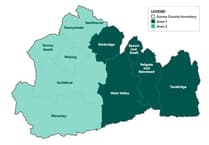Over the past three years, the number of dog attacks in Woking has risen by more than half, yet in more than three-quarters of cases, the police took no action.
Exclusive data obtained under the Freedom of Information Act reveals that of the 443 reported incidents since 2021, 328 saw the perpetrator face no consequences from the police.
That means only about 20 per cent of incidents resulted in any consequence and in most cases - 62 in three years - that was a community resolution. One person was charged and two people were summoned to court.
A further 21 cases were still under investigation at the time of the Freedom of Information request.
Millbrook RSPCA Animal Care Assistant, Hayley, said there is growing concern over dog attacks in the area.
She explained that the majority of dogs coming into the shelter to be rehoused are there due to behavioural issues such as aggression, and many attacks happen because of a lack of control over the dog.
"Dogs who display aggressive behaviour should be muzzled and kept away from situations that could get them in trouble,” Hayley said.
"Owners should be self-aware and ensure they have the correct equipment when taking their dogs into public spaces.”
At the moment there is no requirement to muzzle your dog in the UK unless they are a banned breed. There are only five banned breeds in the UK under the Dangerous Dogs Act 1991 which includes the recently added XL bully, meaning the majority of dogs go unmuzzled.
However, Hayley said despite the stigma around certain breeds it's important that we remember 'it could be any dog' that ends up attacking.
Inspector Matt Songhurst, from Surrey and Sussex Police dogs unit, said the force is aware of the rising number of reports of dog attacks.
"We investigate all incidents where a dog has been reported as being dangerously out of control, and in these circumstances we can seize the dog and take action against owners where victims have been harmed or been left in fear of being harmed,” he continued.
“Officers can also act where a dog is suspected of being a banned breed and seize these types of dogs to protect the public from harm. "
Inspector Songhurst said many incidents are preventable and, as canine behaviour can be unpredictable, it is best not to be too trusting of any dog.
Although there has been an increase in dog attacks in Waverley and Woking, there has been a seven per cent decrease in the number of cases that actually resulted in either resolution or prosecution.
July is the peak month for dog attacks, accounting for 13 per cent of all incidents (56 out of 443) reported over the three years. In contrast, February saw the fewest attacks, with only four per cent of the annual total on average occurring during that month.
There were 59 attacks on children under the age of 10, including 22 cases involving pre-schoolers under five years old. Additionally, 28 incidents were reported involving individuals over the age of 70.





Comments
This article has no comments yet. Be the first to leave a comment.